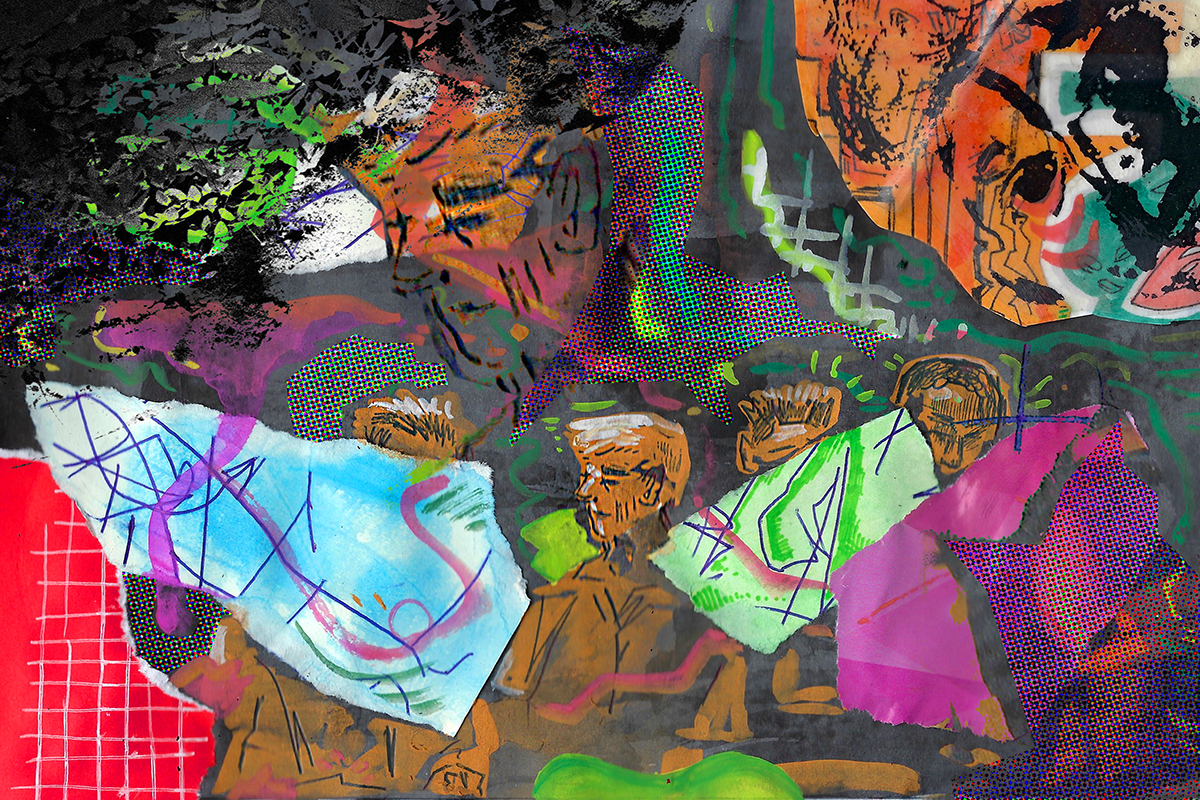For as obscure of a genre as post-punk seems to be, its prevalence in both mainstream and underground music for the last 40 years has been remarkable. Beginning with the likes of The Cure and Joy Division, this reaction to the stripped-back aggression of 70’s punk rock birthed some of the most atmospheric, experimental, and lyrically dense music of its time. Now, decades past, a large-scale revival (and I daresay renaissance) of the style has exploded out of the United Kingdom spearheaded by boundary-pushing acts like London’s own black midi.
In 2017, peers and jamming partners Geordie Greep, Matt Kwasniewski-Kelvin, Morgan Simpson, and Cameron Picton of the esteemed BRIT School would come together to form a band. After taking on the name black midi, this highly skilled collective would go on to release the universally-beloved Schlagenheim in 2019, a post-punk masterpiece filled with noise, punk energy, and progressive rock influences. Following this was 2021’s highly anticipated release of Cavalcade, a marked change in sound but a nonetheless remarkable record. This album showcases a wider breadth of style than their previous record, ranging in sound from pleasant and sweet to harrowingly soft to rigorous and harsh to head-bangingly groovy. It’s threaded with influence everywhere from the instrumental skill and meandering song structure of seminal prog acts like King Crimson and Rush, to the post-punk vocal style and narrative structures of Slint, and even to the jazz flair of their peers in Black Country, New Road. This burgeoning musical feast of a record has the potential to change your conception of what rock music can sound like.
The record opens with “John L,” a song that seems to act as a trial for the weak-hearted. By far the least casually listenable song on the album, this track is a music theory banquet imbued with some of the most positively punishing strings and jarring tempos I’ve heard in recent memory tied together by Morgan Simpson’s absolutely remarkable drumming. This track’s lyrics detail the story of a cult leader, the titular John L, seducing a town with his charismatic promises and mantras only to later be overthrown by the frenzied crowds he himself gathered. The fervent, disjointed nature of the sound on this song fits perfectly with the narrative, almost pulling the listener into the zealous mindset of the indoctrinated.
With a predictably harsh end to track one, the listener experiences sonic whiplash as they begin to be gently serenaded by soft guitar and poetic murmurs in the second song, “Marlene Dietrich.” This song is another narrative surrounding a titular subject, but this track’s “soft spoken queen” stands in stark contrast to John L. Describing the life and work of actress Marie Magdalene “Marlene” Dietrich (1901-1992) in reverent fashion, this brief, sweet song employs more traditional instrumentation and intimate mixing to create a beautifully sentimental atmosphere. The relationship between these first two tracks creates a lovely foil effect in which the best aspects of both are magnified by their juxtaposition with the other.
After the brief respite offered by “Marlene Dietrich” comes once again the harsh sound of an electric guitar riff and the sharp, distinct sound of drums. At three on the track list, “Chondromalacia Patella” tells the story of aging through esoteric imagery describing a knee condition by the name of, you guessed it, chondromalacia patella. This condition is the most common cause of chronic knee pain and is utilized to describe the despair of growing old and losing your mobility, energy, and general painless existence you once had in youth. This song utilizes heavy moments of almost throbbing guitar and drum, seemingly emulating the waves of pain one with chronic pain would feel, before breaking down into an all-consuming din dominated by a repeating guitar riff and drum pattern.
In the most cohesive track transition of the album, our next song “Slow” begins with a heavy rhythm reminiscent of the progressions from “Chondromalacia.” The flow between songs is best seen in the lyrics, however, as this song describes the thoughts of someone frustrated by the slow decay of life, wishing for an abrupt and controlled end instead. Through a utilization of quiet and loud dynamics, the song creates a movement from frustrated to contemplative to resolved. The instrumental crescendos with the almost pleading cry of saxophone and leads up to a sudden lull; then, the narrator utters the lyrics “stood up, shot / between the eyes / s’just consolation.” Our narrator is presumed dead by his own hand, and the sudden sonic explosion back to chaos reflects the gravity and misfortune of that decision.
Immediately after this comes a return to the quiet tones of “Marlene Dietrich”. This time, the notes hold more tension; the playing feels terse and short, and the tone feels unsettling. Song 5, “Diamond Stuff,” gives us a full, uninterrupted two minutes and ten seconds to simply sit with this uneasy feeling as the sparse instrumental steadily grows. This atmosphere continues to thicken until hushed vocals emerge, stating simply “I’m a husk / made up of diamond stuff.” A violin is plucked, the instrumental swells, and the mood changes. What was before a hollow instrumental becomes a contemplative jazz track, reflective and even optimistic in tone. Vocals are murmured in the background, speaking in the abstract about minerals and the body. Developing and emerging from bits and pieces of scattered instrumental, this song crystalizes almost like the very mineral it’s named for, becoming a clear and resilient example of artistic acuity. This track wraps up a loose thematic three-piece discussing age, death, and decay and eventual merging with the earth.
A solitary saxophone ushers in the ending stretches of the record with the opening of “Dethroned.” Followed by the gradual inclusion of guitar and a strong vocal presence, it gives the impression of the beginning of a speech or a journey of some kind. Lyrically, this song veers from the poetic abstraction of “Diamond Stuff” and pursues the direct storytelling style of our first two tracks. It tells the story of a man in denial of his fall from grace; instrumentally, the single saxophone developing into a grandiose instrumental serves this, seemingly attempting to convince the listener of the validity of the narrator’s denial.
The next track, “Hogwash and Balderdash,” is the most blistering we’ve heard since song #1; beginning with blaring cowbell and never truly slowing, it tells the story of two runaway criminals (named Hogwash and Balderdash) with their heels continually nipped at by the jaws of the law. As the title would suggest, the track is largely nonsense– the lyrics speak of the two’s escapades in a style reminiscent of a Dr. Seuss book, describing improbable plights with impish language. The vocals are feverish and crazed and the instrumental leaps and screams as if speaking itself, its pace making this two and a half minute song feel like an even shorter and more thrilling sprint than it already is.
The brazen fun of track seven is infectious but short lived as we move into our final song, the balladic “Ascending Forth.” With an even, calm, almost folkish acoustic melody greeting us, frontman Greep’s medieval and hymnal tone spins a tale of creative struggle. In a narrative every creative is familiar with, he knits a story of a man who makes music to critical acclaim, but is torn between making music he knows the masses will love or making music he finds creatively fulfilling. He agonizes over it, repeating dogmatically “everyone loves ascending fourths,” a form of a note with a sentimental or happy tone. As the public urges him on, he begins his next work, deciding to follow his instinct and create what he wants. Disgusted when presented with his composition, devoid of those beloved fourths, the people condemn him and his masterpiece. The instrumental crescendos, and our narrator breaks. In the following progression of pure emotion, Greep laments once again that “everyone loves ascending fourths,” implying that our narrator has eschewed his inspiration in favor of public adoration, churning out easily loved music after being burned by producing what he himself loved most. Clocking in at almost exactly 10 minutes, this last track is a testament to its own message. It ends perfectly exactly the kind of album the narrator would be shunned for; something difficult, challenging, and dissonant, but absolutely overflowing with artistic integrity and love for one’s craft.
On Cavalcade, black midi has succeeded in creating a collective of some of the most musically exciting compositions I’ve heard in post-punk and even music as a whole in a while. As with most albums, I have my nitpicks; I adore Geordie Greep and Cameron Picton’s vocals, and on most tracks on the album I find that they are a little too deep in the mix for my liking. For how beautiful the lyricism and vocal presentations are, I just wish I could experience them as clearly as possible. With that being said, I truly can’t adequately express how intensely inspired this album feels to me, and my heart aches with the hope that others will feel my love for it and give it a try. There quite simply isn’t anyone doing it like black midi is now, and I can’t wait to see where they take us next.



